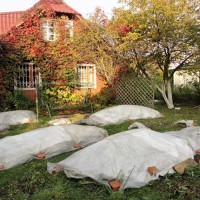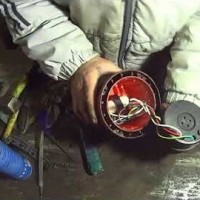Repair of gas ovens: overview of the main breakdowns of gas ovens and recommendations for repairs
The oven is a special technique.The owner spends a long time choosing a device “for herself” and is happy when all the stated parameters meet her expectations. But high-quality performance does not eliminate troubles: the devices have their weak points, and breakdowns occur periodically. Complete independent repair of gas ovens is unacceptable: the warranty is lost, and there is a danger to life and health.
At the same time, there is a list of popular malfunctions that block the operation of burners, but are not related to the gas supply to them or larger problems. They can be easily removed with your own hands. Let's consider such moments when, with a minimum set of tools, you can return the device to working condition. And in what cases will you still need the help of a specialist from the gas service?
The content of the article:
General operating principle of the oven
It is impossible to diagnose a breakdown without familiarizing yourself with the operating principle of the oven.
In older models, gas was supplied to the burner from two pipes located along the side walls. Such ovens were set on fire manually - a tube from a newspaper. The safety of their operation was ensured by free gaps on the sides of the unit and an open lower opening.
Modern models are equipped with profiled round burners and gas control systems. Some devices have electric ignition, grill, convection option, which implies the presence of a fan and heating element.
The most capricious part of the oven design is the ignition.
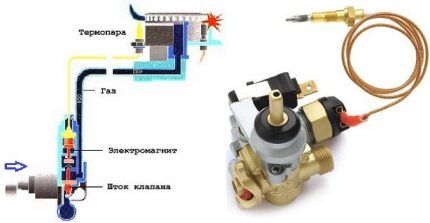
The main oven problems are determined by the following symptoms:
- the gas stopped burning;
- the ignition does not fire immediately;
- the flame differs from the usual one by unevenness of color or burning;
- During operation, the device makes noise and a foreign smell is heard.
Having discovered something similar, turn off the gas supply. Next, we inspect the device for the presence of foreign objects: pieces of food and other debris. If necessary, we carry out cleaning.
Healthy check functionality and the position of all valves. Periodically they need cleaning and preventive maintenance in the form of lubricant. We also pay attention to the condition of the mounting hole. If it is damaged, it is easier to replace the part than to repair it.
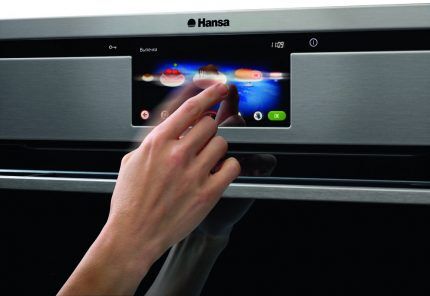
If everything is in order with the cleanliness and condition of the control unit, we proceed to checking individual structural elements.
5 main oven faults
When the fire goes out thermocouple blocks the gas supply. To warm up and activate the device, hold down the ignition button for several seconds. Then we set the temperature, warm up the cabinet and start cooking.
If the oven in a gas stove does not work for no apparent reason, this is a consequence of a breakdown of the ignition, gas tap or other parts of the structure.Let's deal with the problems in order.
Failure #1 - blocking of gas supply by thermocouple
Mechanism gas control operates due to the generation of an energy charge by a thermocouple, which is distributed along the wire to the solenoid valve. The latter expands under the influence of an electromagnetic field.
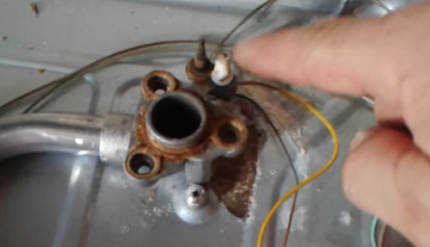
In most cases, a complete replacement of the element is required, which can only be done gas service specialists.
It is recommended that you just try cleaning the tip head with sandpaper. This will help in cases where the flame burns when the button is pressed and goes out when it is released.
Failure #2 - calibration of the safety thermostat
This regulator controls temperature regime in the closet. When necessary, it turns the supply off or on.
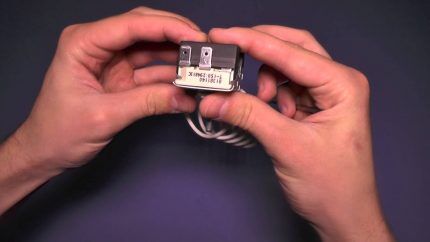
To check the functionality of the thermostat, you need to set the scale to 150 degrees. Inside the cabinet we place a mechanical thermometer in a metal case. It is inexpensive, but helps determine the malfunction.
Then we turn on the oven and after 25 minutes we compare the indicators to see if the cabinet has heated up to 150 degrees. If the discrepancies are limited to within 5 degrees, the element is serviceable and the cause of the breakdown is not in it.
If the temperature difference is more than 5 degrees, the thermostat needs to be replaced, for which:
- We buy a new part for the required oven model.
- Remove the adjustment knob from the control panel of the device.
- Loosen the bolts securing the element.
- We photograph the wiring diagram and disconnect it.
- We remove the thermostat and replace it with a new one.
We repeat the algorithm in reverse order: connect the wiring, fix the bolts, insert the handle. Don't forget to test the new part in the same way as you checked the old one.
The described actions apply to mechanical And electric thermostats. But figure out how to fix it electronic high-tech sensor in a gas oven, only a specialist can help.
Failure #3 - the door does not fit well
There are two cases - loose And tight fit oven doors. In the first situation, heat is lost and the cooking process is delayed indefinitely.
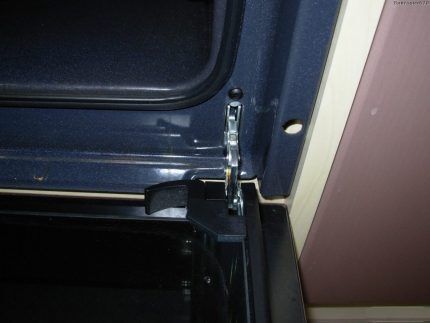
If the problem is with the seal, it needs to be replaced. To do this, we remove the door from its hinges, remove the old gasket, clean the gutter with a solution of laundry soap or detergent and install a new seal.
A tight fit of the door sometimes leads to interruptions in ignition. The lack of oxygen makes the combustion process difficult and the flame goes out. Technological gaps prevent this.
Failure #4 - burner clogged or malfunctioning
If the burner lights up, take a closer look at the color of the flame. Blue indicates normal combustion process. A red, orange tint signals trouble. We recommend that you familiarize yourself with the factors influencing flame color.
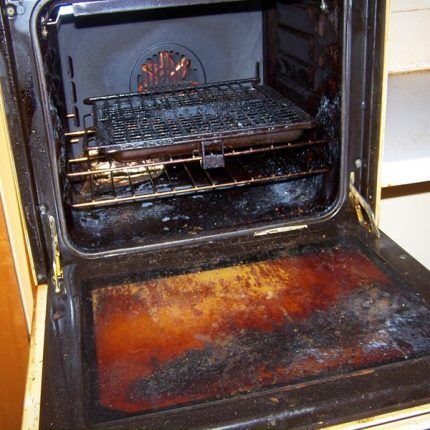
A change in flame color is an indicator of insufficient air quantity in a gas combustion cabinet or evidence of incomplete combustion of fuel. Here you need the help of a specialist.
Another point is clogged injectors. Residues of food and detergents periodically get into them, and fuel combustion products accumulate.
The injectors are cleaned with toothpicks or wooden sticks. Metal tools must not be used.
Failure #5 - heating coil failure
Ovens with convection supplemented with electric heaters. Sometimes the breakdown is related to them.
If the spiral does not work, it needs to be replaced. A new part is purchased at an electronics store.
To make a replacement:
- remove the back wall of the case, open the core of the device;
- release the element from the clamps;
- remove the ceramic insulator - porcelain beads, which are strung on the new heater;
- insert a new part into the grooves and assemble the oven.
It is recommended to take photographs of each step to avoid errors during reassembly.
Tips for preventing breakdowns
To figure out why your gas oven broke down, you need to be careful and careful about the cleanliness of the surfaces of the device and its elements.
Follow the manufacturer's recommendations, adhere to temperature conditions when cooking and baking.
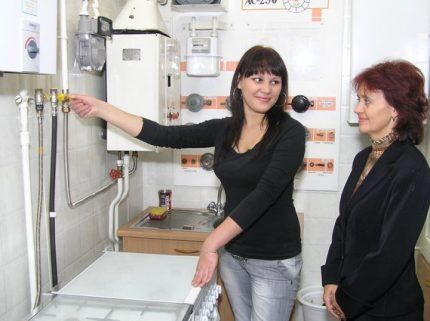
All users of gas equipment after correct installation And oven connections must follow safety rules when operating gas-using appliances.
They are as follows:
- Before turning on the stove for the first time, be sure to undergo training and read the instructions.
- Do not leave a burning oven unattended.
- When the fire goes out, you must first turn off the burner tap and then try to light the burner again.
- The oven must be kept clean. Perform a thorough cleaning at least once a week. Manufacturers recommend doing this after each use.
- Regular and important service maintenance gas oven and stove.
- It is unacceptable to make any changes to the design of the device yourself.
If a leak occurs, turn off the supply valve and call the emergency service. It is prohibited to use the devices until specialists arrive.
We wrote more about ways to detect gas leaks in this material.
Conclusions and useful video on the topic
Gas control device: principle of operation, turning off the supply.
Oven door repair.
How to remove and clean valves.
The gas is highly flammable and explodes. There are hundreds of dangerous situations covered in the media, many of which involve DIY equipment repairs. It's one thing when you need to remove contaminants, remove and clean handles, adjust the door. Replacing the thermocouple and control unit is something completely different.
If you are not confident in your experience or do not have the necessary tools at hand, entrust the problem solving to specialists. They will quickly determine why the oven on a gas stove does not turn on or is not working properly, and will fix the problem..
Have you experienced breakdowns of your favorite oven or are you a professional oven repairer? Share your experience and professional secrets with other users - your recommendations will be of interest to many beginners. Write your comments and advice, add original photos of the renovation, participate in discussions - the feedback form is located below.
